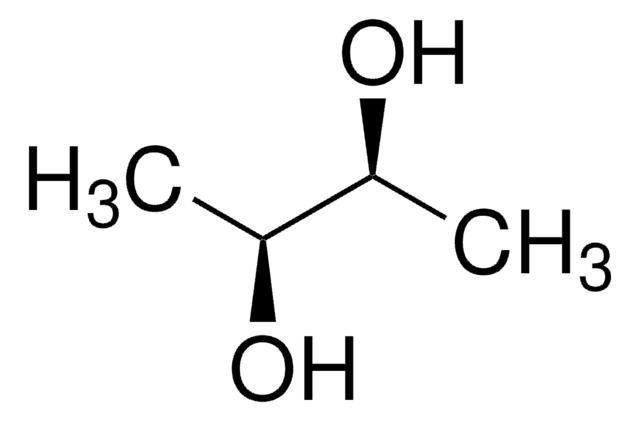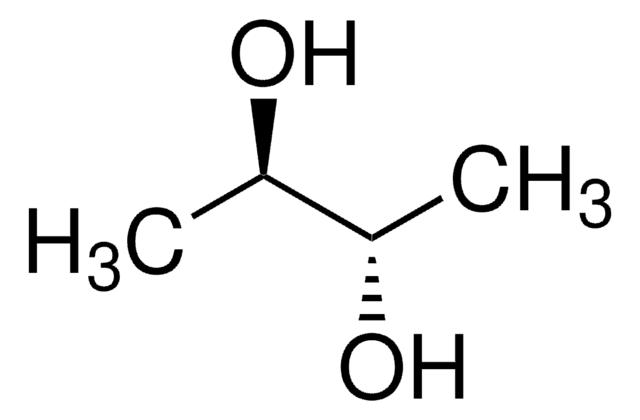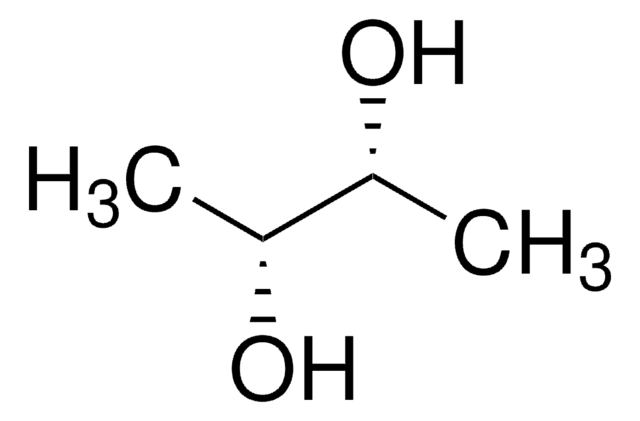A17951
Acetoin
May exist as crystalline dimer
Synonym(s):
3-Hydroxy-2-butanone, Acetylmethylcarbinol
Sign Into View Organizational & Contract Pricing
All Photos(4)
About This Item
Linear Formula:
CH3COCH(OH)CH3
CAS Number:
Molecular Weight:
88.11
Beilstein:
385636
EC Number:
MDL number:
UNSPSC Code:
12352100
PubChem Substance ID:
NACRES:
NA.22
form:
crystals
Assay:
≥98.0% (GC)
Recommended Products
Quality Level
Assay
≥98.0% (GC)
form
crystals
refractive index
n20/D 1.417 (lit.)
bp
148 °C (lit.)
mp
15 °C (monomer)
90 °C (dimer) (lit.)
density
1.013 g/mL at 25 °C (lit.)
food allergen
no known allergens
storage temp.
2-8°C
SMILES string
CC(O)C(C)=O
InChI
1S/C4H8O2/c1-3(5)4(2)6/h3,5H,1-2H3
InChI key
ROWKJAVDOGWPAT-UHFFFAOYSA-N
Looking for similar products? Visit Product Comparison Guide
Signal Word
Danger
Hazard Statements
Precautionary Statements
Hazard Classifications
Eye Dam. 1 - Flam. Liq. 3
Storage Class Code
3 - Flammable liquids
WGK
WGK 1
Flash Point(F)
118.4 °F - closed cup
Flash Point(C)
48 °C - closed cup
Personal Protective Equipment
dust mask type N95 (US), Eyeshields, Gloves
Choose from one of the most recent versions:
Already Own This Product?
Find documentation for the products that you have recently purchased in the Document Library.
Customers Also Viewed
M Otsuka et al.
Journal of chromatography, 577(2), 215-220 (1992-06-10)
Acetoin was quantitatively oxidized into diacetyl by Fe3+ in 1 M perchloric acid. The reaction of diacetyl with 4,5-dichloro-1,2-diaminobenzene afforded 6,7-dichloro-2,3-dimethylquinoxaline (DCDMQ), which was extracted by benzene containing aldrin (25 ng/ml) as an internal standard, and determined by gas chromatography
Ranjita Biswas et al.
Applied microbiology and biotechnology, 94(3), 651-658 (2012-03-01)
Production of 2,3-butanediol by Bacillus subtilis takes place in late-log or stationary phase, depending on the expression of bdhA gene encoding acetoin reductase, which converts acetoin to 2,3-butanediol. The present work focuses on the development of a strain of B.
Maria del Pilar Marquez-Villavicencio et al.
PloS one, 6(8), e22974-e22974 (2011-08-31)
Pectobacterium species are necrotrophic bacterial pathogens that cause soft rot diseases in potatoes and several other crops worldwide. Gene expression data identified Pectobacterium carotovorum subsp. carotovorum budB, which encodes the α-acetolactate synthase enzyme in the 2,3-butanediol pathway, as more highly
Zhen Liu et al.
Bioresource technology, 102(22), 10741-10744 (2011-09-29)
Production of highly pure (2S,3S)-2,3-butanediol ((2S,3S)-2,3-BD) and (3S)-acetoin ((3S)-AC) in high concentrations is desirable but difficult to achieve. In the present study, glucose was first transformed to a mixture of (2S,3S)-2,3-BD and meso-2,3-BD by resting cells of Klebsiella pneumoniae CICC
Pieter Moons et al.
Applied and environmental microbiology, 77(10), 3422-3427 (2011-03-29)
During fermentation of sugars, a number of bacterial species are able to switch from mixed acid production to acetoin and 2,3-butanediol production in order to avoid lethal acidification of their environment, although the regulation of this switch is only poorly
Our team of scientists has experience in all areas of research including Life Science, Material Science, Chemical Synthesis, Chromatography, Analytical and many others.
Contact Technical Service












